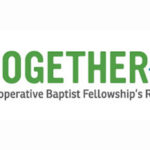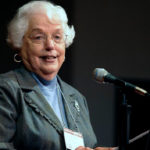ATLANTA—The Cooperative Baptist Fellowship must re-imagine its global missions enterprise, the group’s new missions leader said.
“These are interesting days to be part of the Fellowship, days in which we can no longer count on the old models, the old methods, the structures that once served so well,” new Global Missions Coordinator Steven Porter said during the opening session of the 2014 CBF General Assembly in Atlanta. “It’s a new day, a day that the Lord has made, and so we should rejoice and be glad in it together.”
 Steven Porter says meeting new challenges requires new ways of thinking about global missions. (ABPnews/Herald photo by Bob Allen)“We have recognized that in our leadership structures, and we have changed,” Porter told more than 800 people gathered at a banquet and commissioning service for CBF field personnel, church starters, chaplains and pastoral counselors.
Steven Porter says meeting new challenges requires new ways of thinking about global missions. (ABPnews/Herald photo by Bob Allen)“We have recognized that in our leadership structures, and we have changed,” Porter told more than 800 people gathered at a banquet and commissioning service for CBF field personnel, church starters, chaplains and pastoral counselors.
“We have recognized that on the congregational level in our investment and commitment to missions, and we have changed,” he continued. “We now need to recognize a new day for CBF global missions and align ourselves and our structures and our strategies with the vision of the 2012 Task Force and change accordingly.”
The blue-ribbon task force formed in 2010 in anticipation of the Fellowship’s 20th anniversary the following year held more than 100 listening sessions before bringing a final report to the 2012 General Assembly in Fort Worth.
Recognizing challenges
One recommendation in particular recognized contemporary challenges facing global missions, Porter noted. It said, “CBF continue its goal of fully funding missionaries while also moving to meet the challenges of our changing world.”
That means a new paradigm that views the Great Commission as more than just funding full-time missionaries, said Porter, former director of the CBF-affiliated Touching Miami With Love urban ministry.
“We need space both for a mission board and a missional church,” he said.
Sign up for our weekly edition and get all our headlines in your inbox on Thursdays
A new narrative
He called for a new narrative for CBF global missions that includes “both long-term cross-cultural field personnel and short-term mission trips; both traditional big-steeple churches and small, intentional, radical communities; local church networks and state and regional organizations; the Baptist World Alliance and ecumenical partners; publishers and press agencies; educational institutions and mission communities; fully funded field personnel and partner-funded field personnel.”
“In this new missionary situation, our mission enterprise resembles a web more than silos,” Porter said. ”Hard and fast divisions between our congregational and our global mission endeavors must cease, because they make less and less sense by the day and hour.”
Porter described the Fellowship as “a movement that rejected the false assurances of fundamentalism without relinquishing a passionate desire to see the world come to a saving knowledge of Jesus Christ.”
The declining influence of Christianity in the West indicates the old models of evangelism and missions are no longer working as well as they did in the past, he insisted. Meanwhile, Christianity is seeing explosive growth elsewhere, especially in the global South.
“Perhaps given Christianity’s decline in our neck of the woods, it’s past time for us to listen more and speak less,” he suggested, “a time to enlist the help of brothers and sisters from the global church to help us live out the old, old story in new ways and new tongues in our communities.”
More reciprocity
An increasingly global Christianity will require more “reciprocity” in global missions, he said.
“I wonder what it would look like to reimagine mission as a movement to receive missionaries as well as send them,” he said. “What if we partnered with friends from the New Baptist Covenant … to plant churches in African-American neighborhoods where many of our urban field personnel already presently serve?
“What would it look like for CBF to partner with the Myanmar Baptist Convention to send missionaries to reach the 73,000 Burmese refugees that have been resettled in the United States since 2005? We have commissioned field personnel serving them now. What would it look like to join forces with indigenous missionaries from those cultures?
“Reaching the new diasporas of our own cultural backyards may require us to listen to and learn from the leadership of those we have often served but also often politely ignored.”














We seek to connect God’s story and God’s people around the world. To learn more about God’s story, click here.
Send comments and feedback to Eric Black, our editor. For comments to be published, please specify “letter to the editor.” Maximum length for publication is 300 words.